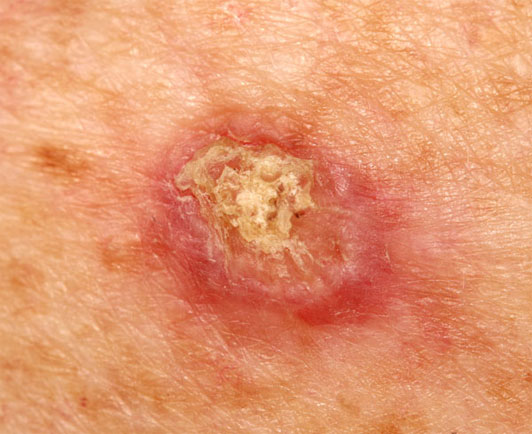Squamous Cell Carcinoma (SCC) is a common form of skin cancer that arises from the squamous cells, which are flat, thin cells found on the surface of the skin. It is usually caused by exposure to ultraviolet (UV) radiation from the sun or tanning beds, but it can also develop on skin areas that are not sun-exposed. SCC is less aggressive than melanoma but has a higher risk of spreading to other parts of the body than basal cell carcinoma. Early detection and treatment are crucial to prevent further complications.
Recognizing SCC: Signs and Symptoms
SCC often appears as a firm, red, scaly bump or a flat sore that does not heal. It can be tender to touch and may bleed easily. SCC lesions can develop anywhere on the body but are more commonly found on sun-exposed areas, such as the face, ears, neck, arms, and back of the hands. Individuals with fair skin, a history of excessive sun exposure, and a weakened immune system are at a higher risk of developing SCC.
The Dermatologist’s Role in SCC Detection and Treatment

Comprehensive Skin Examination
Regular skin examinations by a dermatologist are vital for early detection of SCC. Dermatologists have the expertise to identify suspicious lesions that may require further evaluation.

Biopsy and Diagnosis
If a suspicious lesion is found, the dermatologist will perform a biopsy, where a small sample of tissue is removed and sent to a laboratory for examination under a microscope. A biopsy is necessary to confirm the diagnosis of SCC.

3. Integrated Approach: SCC treatment depends on the size, location, and stage of the cancer. The main treatment methods include:
- Surgical Excision: The tumor and a surrounding margin of healthy tissue are removed.
- Mohs Micrographic Surgery: This specialized technique ensures complete removal of the cancerous cells while preserving healthy tissue, making it ideal for tumors in critical areas or with unclear borders.
- Cryotherapy: Freezing the tumor with liquid nitrogen.
- Topical Treatments: For superficial SCCs, creams or gels with medications like imiquimod can be used.
- Radiation Therapy: For large tumors or those in difficult-to-treat areas.
1. Lymph Node Evaluation: In some cases, the dermatologist may recommend a lymph node biopsy to check if the cancer has spread to nearby lymph nodes.
2. Follow-up Care: Regular follow-up visits with the dermatologist are essential after treatment to monitor for any signs of recurrence or new SCCs.
Promoting Prevention and Sun Protection
Dermatologists play a crucial role in educating the public about SCC prevention
- Encouraging sun-protective measures, such as wearing sunscreen, protective clothing, and seeking shade during peak sun hours.
- Discouraging the use of tanning beds.
Squamous Cell Carcinoma is a common and potentially serious form of skin cancer. Early detection, accurate diagnosis, and appropriate treatment are vital for achieving the best outcomes. Dermatologists play a crucial role in identifying suspicious lesions, diagnosing SCC, and providing tailored treatments. By promoting prevention and offering expert care, dermatologists contribute significantly to reducing the burden of SCC and enhancing the overall skin health of their patients.

